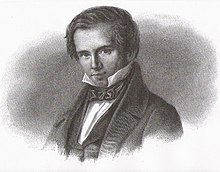Karl August Nicander
Karl August Nicander (born March 20, 1799 in Strängnäs ; † February 7, 1839 in Stockholm ) was a Swedish writer and poet . He was best known for his lyrical short poems. He was a member of the writers' association Gothic Bund .
Life
Nicander attended Strägnäs grammar school, where he became a trusted friend of Erik Sjöberg . In 1817 he moved to Uppsala and made his debut with the lyrical work Kalender för Damer (“Calendar for Ladies”), which was received with great acclaim by the organ of the neo-romantic school Svensk Literaturtidning . These poems were mostly reminiscences of German and Swedish poetry. The piece Korsets tro ("Faith of the Cross"), however, revealed his own talent for poetry. In 1820 Nicander had great success with the tragedy Runesvärdet och den förste riddaren ("The rune sword and the first knight"), in which the poet describes a tragic fate in the period of upheaval between paganism and Christianity.
In 1822 he became a member of the Gothic League , from 1823 worked in a law firm as a copyist and in 1824 received a master's degree in philosophy . In 1827, with the support of Crown Prince Oskar and the Swedish Academy, he took a trip to the land of his dreams, Italy. This time represented a turnaround in his life. He had to return to his homeland under great economic constraints, which he could never work his way out of later. His friend Hugo Hamilton supported him on his return in 1829, paid his travel debts and took him in from 1834-1835.
Nicander Schillers arranged Die Räuber (1834) and Die Jungfrau von Orleans (1836) for the stage . He suffered from severe heart disease and was staying with the bookseller Adolf Bonnier during the last years of his life.
Nicander's poems are shaped by eclectic poetry. He wrote in an unusually splendid and sensual form and therefore became popular in circles that Atterbom's deeper poetry , for example , could never achieve. Nicander's poetry was precocious and revealed early what was in him. But he missed stronger development opportunities. Individual short lyric pieces such as Vågen , Aftonen or Mitt lif, min sång, min död are remarkable .
He was buried in the cemetery of St. Mary Magdalene Church in Stockholm.
Works
- Runesvärdet (1820)
- Fosterlandskanslan (1825)
- Dictator (1825)
- Dictator (1826)
- Markus Botzaris (1826)
- Tassos död (1826)
- Nya dicter (1827)
- Minnen från Södern (1831–1839)
- Hesperider (1838)
- Samlade dicter (1839–1841)
Prizes and awards
- Second Prize from the Swedish Academy (1825) for Fosterlandskänslan
- Grand Prize of the Swedish Academy (1826) for Tassos död
- Second prize from the Swedish Academy (1831) for Månskensnatten i Albano
literature
- Karl August Nicander . In: Theodor Westrin (Ed.): Nordisk familjebok konversationslexikon och realencyklopedi . 2nd Edition. tape 19 : Mykenai-Norrpada . Nordisk familjeboks förlag, Stockholm 1913, Sp. 921-922 (Swedish, runeberg.org ).
- Karl August Nicander: Runes . in the Google book search translation by Friedrich Mohnicke
Web links
- Biography. In: svlihist. Retrieved November 24, 2014 (Swedish).
Individual evidence
- ^ A b Karl August Nicander . In: Theodor Westrin (Ed.): Nordisk familjebok konversationslexikon och realencyklopedi . 2nd Edition. tape 19 : Mykenai-Norrpada . Nordisk familjeboks förlag, Stockholm 1913, Sp. 921 (Swedish, runeberg.org ).
| personal data | |
|---|---|
| SURNAME | Nicander, Karl August |
| ALTERNATIVE NAMES | Nicander, Carl August |
| BRIEF DESCRIPTION | Swedish writer and poet |
| DATE OF BIRTH | March 20, 1799 |
| PLACE OF BIRTH | Strängnäs |
| DATE OF DEATH | February 7, 1839 |
| Place of death | Stockholm |
